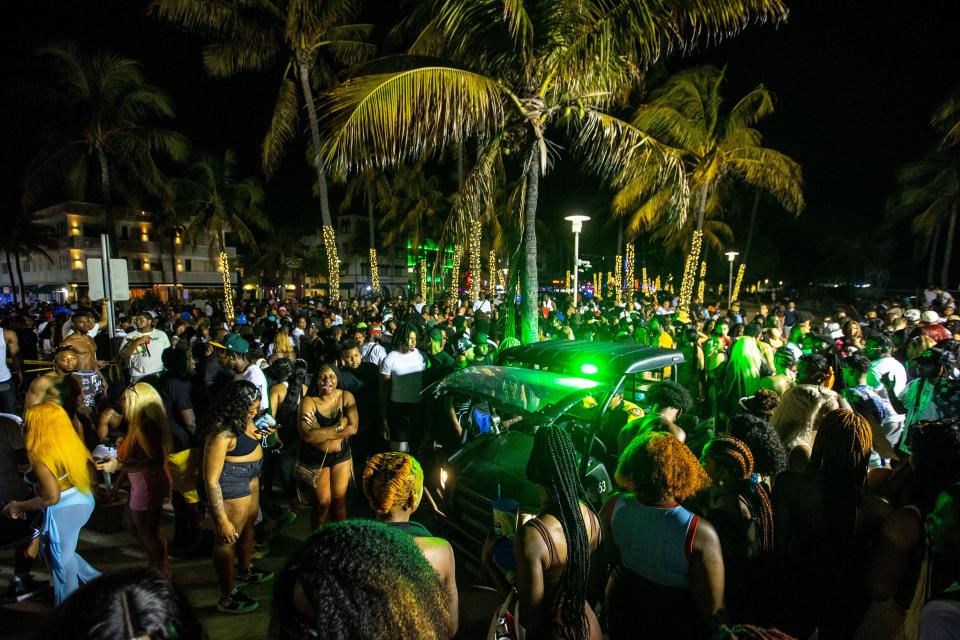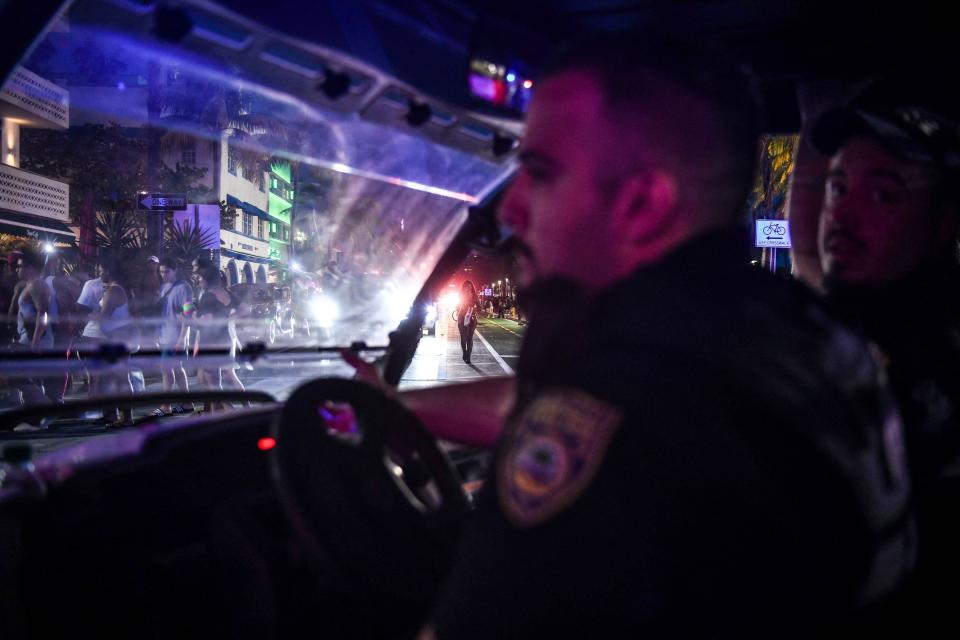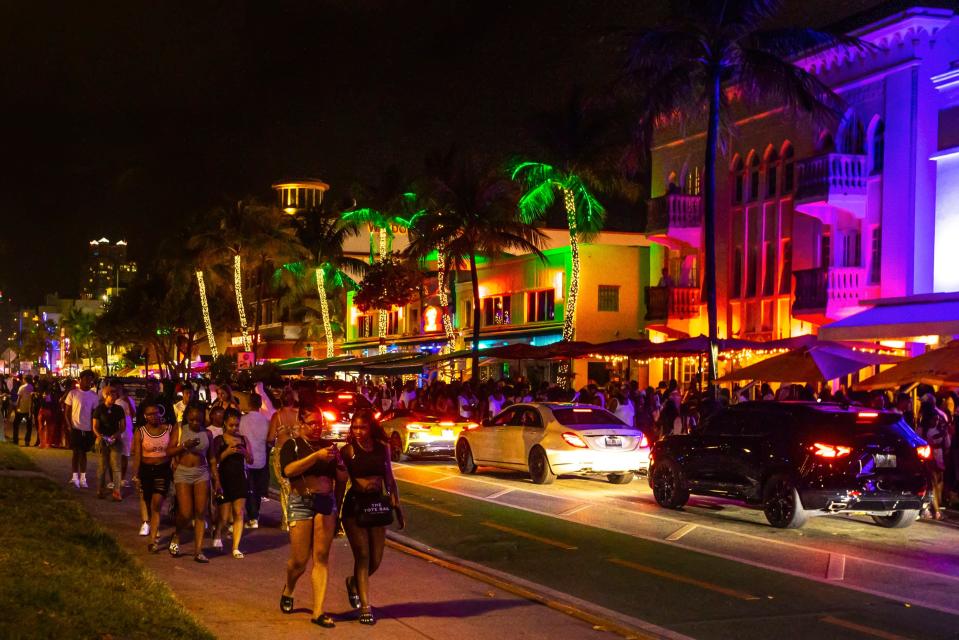Miami Beach is setting a spring break curfew. Is it 'heavy-handed' or a matter of public safety?
The city of Miami Beach is pushing back against the annual influx of spring break tourists, this time with a midnight curfew and a state of emergency.
But some residents of the famed South Florida party destination are wondering if such action is necessary – even after a pair of shootings left five people injured in two days last week. Or if it will make a difference.
Mayor Dan Gelber isn't one of those people. A Miami Beach native, Gelber told USA TODAY that the mix of large crowds, the presence of guns and a perception that "anything goes" has made spring break increasingly dangerous over the years.
"I've said very publicly and repeatedly that we don't want spring break," Gelber said. "It's quite perilous."
Spring break annually draws thousands of college students and tourists to Miami Beach, a community of nearly 90,000. Several city commissioners acknowledged business owners who typically see high profits in March may sue the city over the curfew , but agreed that public safety was the top priority.
NEWS AT NIGHT: Sign up for USA TODAY's free Evening Briefing newsletter
The curfew is from midnight to 6 a.m., starting Thursday and lasting through Monday. Police will start sending people home at midnight and making sure businesses are closed, Gelber said. Officers may also set up checkpoints, he said, and Gelber is considering shutting down the causeway into the island if necessary.
It's the latest effort by city officials to control spring break crowds after a crackdown in 2021 led to a curfew and more than 1,000 arrests.,
Pierre Rutledge, chair of the Miami-Dade County Black Affairs Advisory Board, said while any violent incidents or arrests are an issue, the city should have been better prepared for the influx of people and potential for crime.
He called the curfew and state of emergency declaration "reactive" and said it could make the situation worse.
"The optics in terms of the national stage really looks bad," Rutledge said. "Perception often becomes reality."

Hotels in Miami Beach were at nearly 87% occupancy last week, a slight increase from this time last year and similar to levels seen before the COVID-19 pandemic, according to data provided by the Greater Miami Convention and Visitors Bureau.
City Manager Alina Hudak described the South Florida city during a press conference Monday as an "island with limited capacity" unable to accommodate the large crowds that flocked to the public park and streets over the weekend.
Miami Beachreminded visitors to enjoy the city safely in its marketing campaign this year, Matt Kenny, the city’s assistant director of marketing and communications told the Miami Herald. Officials also sponsored a concert and event series featuring artists including Alanis Morissette and Juanes.
"We have a lot of different initiatives happening to try to at least maintain some level of order," Gelber said, noting the city has hired dozens of "goodwill ambassadors" to engage with the community.
MIAMI BEACH DECLARES STATE OF EMERGENCY: Curfew set after a spate of spring break shootings
The city also deployed more than 370 officers over the weekend.
The curfew comes after three people were wounded early Sunday on a street crowded with spring breakers in the city’s South Beach neighborhood, police said.
Longtime resident Mitch Novick was walking by Lummus Park along Ocean Drive after finishing dinner late Saturday when gunshots rang out. While recording on his cellphone, he ducked behind a vehicle and watched as police officers ran toward the sound of the gunfire.
"It's very dangerous," Novick said. "That's what it's like on Miami Beach streets, especially during the month of March."
The next day, officers patrolling about a block from the site of the overnight shooting heard gunshots and found two women had been shot.
Novick, owner of the Sherbrooke Hotel, said the violence has gotten "considerably worse" in the past decade and local leaders have failed to address it, citing the recently failed attempt to ban alcohol sales after 2 a.m. in South Beach. In addition to the curfew, Miami Beach city commissioners voted Tuesday to give the city manager the power to stop liquor stores and other retailers from selling alcohol in the area.

The state of emergency declaration claimed that unruly crowds have taken over the city's streets and refused to obey orders from law enforcement. Police made more than 600 arrests between Feb. 18 and March 20 in the area where the curfew will be implemented, according to the declaration, but it is unclear if the arrests were connected to spring break tourism.
"Officers are EXHAUSTED. The party needs to end,” the city's Fraternal Order of Police said on Twitter. “City officials must take immediate and firm action to ensure the safety of officers and residents.”
Miami Beach Police and the Fraternal Order of Police did not respond to a request for comment from USA TODAY.
While Gelber acknowledged business owners may be upset about lost revenue, he said public safety would take priority. The Miami Beach Chamber of Commerce declined to comment on the potential impact of the curfew on local businesses.
"I'm not gonna engage in analysis and say 'we were afraid to lose revenue, so we're going to suffer the disorder,'" he said.
'TOO MANY PEOPLE': Miami Beach spring break arrests aren't all out-of-towners as city deals with spring break
Matthew Gultanoff, 36, who has lived in the area for 10 years, called the curfew "heavy-handed" – especially since he feels the area is less crowded than last year.
"Just a few hours after the first shooting incident over the weekend, my wife and kids and I, we rode our bikes along Ocean Drive to go have breakfast somewhere in South Beach," he said. "The broken glass bottles and everything is clean, you would have no idea."
Miami Beach officials announced a curfew last year in an effort to curb excessive drinking and violence, but a curfew-defying crowd remained on Ocean Drive the weekend it was enacted.

More than 1,000 people were arrested for public consumption of alcohol, drugs, obstruction and resisting arrest and other misdemeanors over the course of six weeks starting Feb. 3. Slightly more than half of those arrested lived outside of Florida, according to city data.
In June, the Miami Beach City Commission passed a law that allowed officers to arrest people who “interrupt” or get too close to them while they are working, the Herald reported. Over the course of one weekend the following month, Miami Beach police arrested more than a dozen people, almost all of whom were Black and recording police officers, sparking a number of legal challenges, according to the Herald.
Local leaders and activists, including members of the city’s Black Affairs Committee,criticized law enforcement for using rubber bullets and military-style vehicles to disperse predominantly Black crowds.
“I believe the city’s reaction is unfair,” Daniella Pierre, the NAACP chapter president, told NBC Miami at the time. “They only do it when it’s these type of events, spring break and urban beach weekend. When you have any other activities on Miami Beach, you don’t get pepper bullets shot at you."
Gelber said officials implemented a curfew based solely on the weekend shootings and called claims that the decision was motivated by race "absurd."
"Our police have handled a spring break superbly in a sense that I think they've showed a great deal of restraint given incredible challenges," he said. "I understand the criticism, but I don't in any way accept it."
Contributing: The Associated Press
Contact Breaking News Reporter N'dea Yancey-Bragg at [email protected] or follow her on Twitter @NdeaYanceyBragg
This article originally appeared on USA TODAY: Miami Beach spring break curfew: 'Heavy-handed' or a matter of safety?
